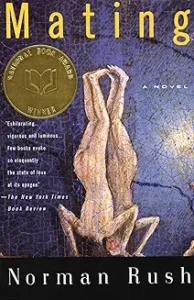Mating by Norman Rush 1991
This book was recommended some time ago by a writer friend, but I hadn’t gotten around to reading it until now. I’m pleased I did so, because this is a big novel in every sense. It’s long, nearly 500 pages of tightly written prose. It’s sweeping in its Botswana setting. It’s deep in its character development and their conversations about philosophy, social organizations, feminism, power, and sexuality. And it’s powerful in that aspect of ficton which I find most engaging, i.e. the staying power of a book when one is not reading it. This book stayed with me moment to moment during the week I read it even as I was doing something else.
I had known of Rush largely through this wonderful quote I had come across somewhere: “Literature is humanity talking to itself. The main effort of arranging your life should be to progressively reduce the amount of time required to decently maintain yourself so that you can have all the time you want for reading.” Reading his bio on Wikipedia shows why it’s no surprise that I hadn’t known of him. ‘Mating’ was his first novel and he’s only written two more, the third one published 10 years ago. While not exactly a ‘one hit wonder’, he has done little since his National Book Award win for ‘Mating’.
This is a densely written, first person narrated story largely taking place in a small village in the Kalahari Desert. Tsau was founded by Nelson Denoon, an American sociologist/anthropologist/urban planner who created a village to show that true socialism, cooperation, and feminist power could result in a better life for its inhabitants. His world becomes complicated by the narrator, a 32 year old Stanford PhD candidate who is in Botswana for field work on her thesis. She has read and admired Denoon from a distance and contrives to meet him. She strikes out alone through the desert to reach Tsau and ‘get’ Denoon. After a harrowing journey, she achieves her goal—they fall in love and live in Tsau in what becomes an increasingly complex environment with petty jealousies and power struggles—women/men, Black/white, West/Africa. While dealing with these issues, the novel is primarily a story of their love affair. There is abundant sexual content, but no love scenes. Sex, rather, is another one of those topics that the narrator explores intellectually though often in specific detail.
The writing is tight though the abundant use of French, Latin, and obscure English words was occasionally annoying. I spent a fair amount of time on Google looking up words such as noetic, uchronia, fichier, and many others. While often interesting, I don’t anticipate using any of these in the future.
As I often do upon completing a review, I went looking for the New York Times review of this book, and much to my surprise, instead of having to go back to 1991, there was a review from March, 2023 about ‘Mating’ as a new cult classic. Evidently, the book, now in its 41st printing, has been identified, largely by women, as a model for a romantic relationship between equals. Who knew!
If you like big books, Africa, feminist theory, and romantic love (and that should include just about 100% of readers), give this book a try. Like most novels, you’ll either be hooked by page 10 or you’ll get restless and move on. I was hooked.



